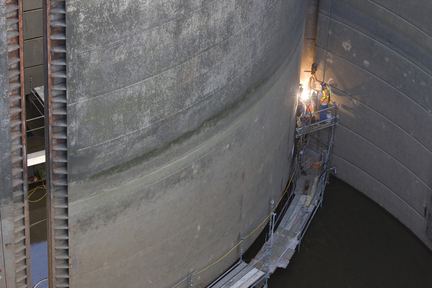forum
library
tutorial
contact

Dalles Lock Closure
Could Have Been Worse
by Jonathan BrinckmanThe Oregonian, October 6, 2009
|
the film forum library tutorial contact |

|
Dalles Lock Closure
by Jonathan Brinckman |
 PORTLAND, Ore. -- The continuing shutdown of The Dalles Dam's navigation lock has stranded barges loaded with millions of dollars' worth of wheat, left Washington's Tri-Cities area without deliveries of gasoline, diesel and aviation fuel, and prevented Vancouver from barging its garbage to a landfill near Boardman.
PORTLAND, Ore. -- The continuing shutdown of The Dalles Dam's navigation lock has stranded barges loaded with millions of dollars' worth of wheat, left Washington's Tri-Cities area without deliveries of gasoline, diesel and aviation fuel, and prevented Vancouver from barging its garbage to a landfill near Boardman.
It has also forced barging companies to temporarily lay off dozens of workers.
But it could have been worse.
Oddly, the recession's economic slowdown has helped. Because no pipeline leads to tank farms in the Tri-Cities area, for example, a sudden halt in deliveries of fuel could have led to serious shortages in normal years. But with fuel demand dampened by the recession, fuel supplies should last until the lock reopens Saturday, authorities say.
For wheat farmers, the fact that the closure came after harvest is key. Farmers need to get grain off the fields soon after it ripens, so having room in storage elevators in late summer is essential. Enormous barges - each holding 120,000 bushels - were able to bring wheat to Portland's export terminals during this harvest season.
"If this (lock closure) would have happened a month ago, it would have been a big problem," said Arvid Lyons, manager of Lewiston, Idaho-based Lewis-Clark Terminal Inc. "We got lucky." The company can store about 5 million bushels of grain in two facilities.
Still, the closing comes as a warning.
Most of the eight federal dams between Portland and Lewiston were built in the 1950s and '60s. With locks expected to last 50 years or so without significant rehabilitation, the Columbia-Snake waterway system now is in need of care.
"The Dalles issue just shows you that the lock system needs to be in good shape physically," said David Gordon, the general manager of a 1,200-member grain cooperative in Walla Walla that operates 19 grain elevators. "We need to be repairing our locks."
Plans for some repairs have been made. The U.S. Army Corps of Engineers, which owns and operates the eight dams, plans to close the locks at The Dalles, John Day and Lower Monumental dams for 14 to 16 weeks starting in December 2010 for refurbishments. Much of the funding for the work will come from the American Recovery and Reinvestment Act of 2009.
"The good news is the federal government is making investments in this river system," said Glenn Vancelow, executive director of the Pacific Northwest Waterways Association, a Vancouver-based trade group.
While the enormous barges that ply the river system provide an energy-efficient and cost-effective way to move goods, trains and trucks are good alternatives. With more than a year left before the three locks are closed, companies, farmers and others have time to arrange alternative transportation.
Not so, this time.
"The fact that it was unplanned is a problem for barge companies," Vancelow said of The Dalles shutdown.
Many of the commodities carried down river have to get to ships waiting in Portland for export to Asia. Some manufacturers and farmers have arranged to send goods by rail or truck, as they do for two weeks in March when regular maintenance is scheduled. But goods already loaded onto barges have to wait until the lock reopens.
Tidewater Barge Lines, with five tugs and about 20 barges stranded east of The Dalles, has laid off about half its work force of 170 people. Shaver Transportation Co. has laid off about half of its 65 workers.
"When we had no warning, it caused us some concern," said John Piggot, assistant to the president at Tidewater.
The Dalles lock was closed at 3:30 p.m. Sept. 29 by the corps' engineers, who subsequently found extensive cracking on both sides of the lower portion of the downstream gate. The agency now has repair teams working 24 hours a day and expects to have the lock operating by midnight Saturday.
"We know this has a huge impact," said Diana Fredlund, a spokeswoman for the corps' Portland district. "Our mission is to maintain the navigation locks and the waterways."
Information from: The Oregonian, http://www.oregonlive.com
Related Pages:
Domestic Waterborne Commerce, Army Corps of Engineers, Transportation Energy Data 1970-2002
Snake River Freight Army Corps of Engineers, Government Report
Snake River Commodity Tonnage Army Corps of Engineers, Data from 1990-2003
learn more on topics covered in the film
see the video
read the script
learn the songs
discussion forum
